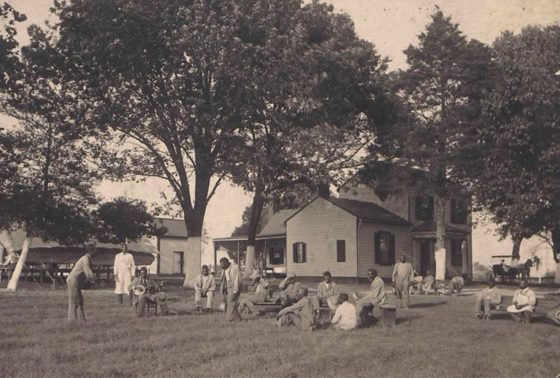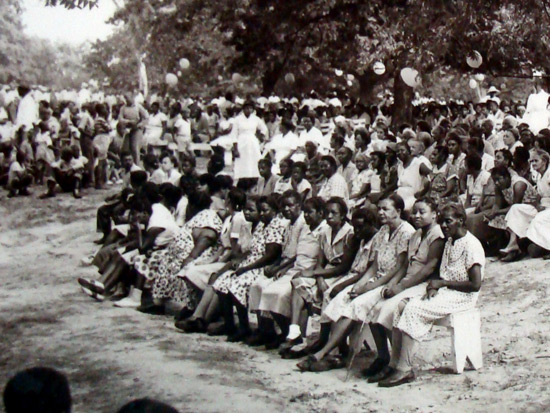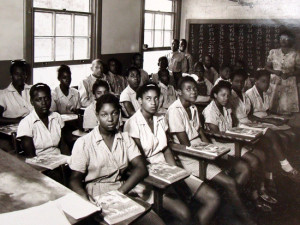The Central State Lunatic Asylum for Colored Insane was established in 1868 in Petersburg, Virginia. It was the first facility in the United States established for African Americans who were “of unsound mind.” Prior to the opening of the facility, Virginia legislators concluded that slaves were immune from the risk of mental illness because they did not own property. Only white men who were engaged in the stresses of commerce and property ownership were thought to be vulnerable. However, as the civil war came to a close, legislators sought to maintain control by asserting that large numbers of African Americans would become mentally ill, particularly if they migrated away from the South. Physicians created unique diagnoses of African Americans who sought to escape from slavery. In the post-Civil War era up through the end of the civil rights era when the hospital was integrated, many African Americans were deemed insane and confined in the facility for simply not following the etiquette of Jim Crow. Among the reasons for admittance, according to official records, were refusing to step off a sidewalk to let a White man pass, talking back to a police officer, or getting into an argument with one’s boss.

The records of Central State Hospital, as it was known after 1893, were stored in filing cabinets on site. Due to a narrow interpretation of the records retention law in Virginia, all of the documents, which contain a treasure trove of African American history, were scheduled to be destroyed.
 King Davis, the Mike Hogg Professor in Community Affairs and the inaugural director of The Institute for Urban Policy Research & Analysis at the University of Texas at Austin, previously served as commissioner of the Virginia Department of Mental Health. He knew the historical value of the records. Professor Davis was able to prevent their destruction and in 2010 began the process of digitally scanning more than 800,000 records, photographs, letters, and other documents. Currently, Virginia legislators and mental health officials recognize the value of the historical records and encourage the research. Faculty at Virginia State and Howard University have participated in the project and serve on the advisory board.
King Davis, the Mike Hogg Professor in Community Affairs and the inaugural director of The Institute for Urban Policy Research & Analysis at the University of Texas at Austin, previously served as commissioner of the Virginia Department of Mental Health. He knew the historical value of the records. Professor Davis was able to prevent their destruction and in 2010 began the process of digitally scanning more than 800,000 records, photographs, letters, and other documents. Currently, Virginia legislators and mental health officials recognize the value of the historical records and encourage the research. Faculty at Virginia State and Howard University have participated in the project and serve on the advisory board.
The digitized records are stored on computer hard drives but Professor Davis is seeking funding to create an online digital archive that will be available to researchers and family members who had a relative that was a patient at the state hospital. The software to create the database is already in the works. “We need $300,000 to support the faculty and graduate students from the Information School who will develop the software, upload the documents and analyze,” Professor Davis told JBHE.
Dr. Davis said they have examined only the tip of the iceberg of the data on the admission of African Americans to the hospital. “Poverty was a key factor in admissions then and now and blacks were more likely to have been involuntarily admitted through the court system,” Professor Davis reports. “Until we go through thousands of records we cannot say what the exact trends we will find. This is part of the reason these records are so vitally important. Most have never been examined so there is so much that we do not know about.”
Another major concern is patient and family privacy. Professor Davis said, “We are guided first by the Virginia statute that says records are only made available after a 75-year period for research purposes. We also will institute a process that will only make certain records available online that are ‘public records.’ These would include annual reports, budgets, news articles, and related documents. We would have a second tier that would require families interested in the records to access them at the hospital after their affiliation has been assured.”

Professor Davis says there is a tremendous interest among the public in learning about family members who might have spent time at Central State. “Each time that I have presented this topic at mental health conferences, a psychiatrist, social worker, psychologist, or politician has inquired whether I can confirm the name of one of their relatives who was hospitalized there.” The actor Blair Underwood recently revealed that his grandfather had been a patient in this hospital many years ago.
Dr. Davis says that when researchers have been able to analyze all the data, the information could lead to new discoveries about the state of mental illness in African Americans. “For example,” Dr. Davis told JBHE, “African Americans delay seeking help for mental health problems far longer than other populations. We consult our pastors for these problems and continue to believe that we’ll get better without formal mental health care. Part of the explanation for these findings is hidden in these historical records. There aren’t as many studies as you would imagine and there are very few that are unbiased. Research based on the archival data will yield information that can be useful to change the outcomes of future stories.”
All photos courtesy of LiberalArtsUT



It will be interesting to find out more about what was presumed to be mental illness and racism’s role in designating someone as mentally ill. To think that mental illness was initially “reserved” for whites who owned property is absurd at best. The stresses of slavery likely contributed to a substantial amount of mental illness as well as depression and anxiety among African-Americans (I think white folk were just crazy!). Finally, African-Americans need to stop relying on pastors for help with mental illness and pastors need to stop acting like they are qualified to address mental illness. The best advise they could give would be to recommend the person see a mental health professional.
I totally agree with your comment. How could Africans not be depressed or mentally ill given the atrocities of enslavement? As far as whites go, if they have a soul, how could they not be disturbed by their acts or those they observed committing such brutality on another life? Finally, and most importantly, pastors need to stop pretending they are the be-all and know-all for people struggling emotionally. Great, great comment.
Jonathan Metzl wrote a very insightful book about this very topic. The name of the book is The Protest Psychosis: How Schizophrenia Became a Black Disease (Beacon Press, 2010). It is really eye opening about mental illness and marginalized/disenfranchised portions of society. I like how this has become a field of study. This opens up a better conversation concerning health care in America.
Thank you for reporting this story. This research is so important to continuing accurate studies of mental illness among African Americans. In North Carolina, my ancestor was committed to an asylum for the “insane crime of shooting a white man.”
Before ALL the records in this country are destroyed, a commitment to historical accuracy about African Americans is paramount. Thank you Professor Davis.
African Americans are particularly underserved when it comes to mental health. Any light that can be shed on the topic of our mental health is welcomed and needed.
A must-read book dealing with mental illness and black people is Post-Traumatic Slave Syndrome: America’s Legacy of Enduring Injury and Healing by professor Joy DeGruy Leary of Portland State University in Oregon. EVERY black person should read this book, and others should read as well. This book is PROFOUND.
My father, Dr. Aubrey S. Escoffery, was among the groundbreaking psychologists who first integrated the staff at Central State. Prior to his time, the preponderance of the clinicians were physicians, but not necessarily psychiatrists, or even practitioners with backgrounds in mental health. At ninety years old, he still has many stories to tell about how critical it was to advocate for these patients, who were subject to numerous atrocities, from various forms of experimentation to forced sterilization. Hopefully, Dr. Davis will discover some of his notes, along with those of Dr. Florence Farley, and others who worked at Virginia State College in the 1950’s. Thank you Dr. Davis for this crucial and important contribution.
It is ashamed that even today many African-Americans are still being experimented on without their knowledge or informed consent. What Edward Snowden uncovered is just the tip of the iceberg? Everything just went underground. Yes, people do get depress, but they do not have a mental illness. Check out the Citizen’s Commission on Human Rights, http://www.cchr.org, on the truth behind mental illness, which is NOT a disease. It is a great marketing plan, which has no scientific basis. It is a great marketing campaign. No test can determine mental illness. African-Americans have been used as their human guinea pigs for over 100 years. I recall what a Caucasian woman said about African-American if you want to hide anything from an African-American just put it in a book. There are probably people who are being compensated to support mental illness without any basis. I did the research. Like the Germans the rogue Feds, doctors, and Americans have become very good at lies and deception. Slavery has never ended, it just has a different name, Generational, lifetime, involuntary or unwitting human subjects. Slavery was generational. Slavery occurred lifetime for the slave. It was involuntary or unwitting, which the “masters” could do anything to them. There was no recourse for them. Visit http://www.ManifestTheTruth.com for additional info.
Well it is a certain thing as mental illness! I did the research.
How come every part of your body can have something wrong with it expect your brain??? Are you kidding me?! There are people born with half a brain, or a brain that doesn’t work properly, not wired right and they think and feel differently. They have done tons of research on the brain and know a lot about it. I have seen a MRI of a brain with mental illness and a normal brain. You can see the difference. Ask the men and women that have come home from war and tell me there is no mental illnesses! I had a Uncle that was in the Vietnam War. He hasn’t been the same mentally since. He died a few years ago.
Human beings – animals too – are harmed by violence, oppression, war, any and all kinds of evil. But the suffering does not originate from the brain, It’s normal reactions to being subjected to, and witness to, evil acts. That there are examples of organic brain lesions and illnesses, cancer for instance, is not proof of mental suffering as brain illnesses. Some may be, most are created and developed by cruelty, brutality, evil injustice of men (humans) and societies.
I hear a lot of people stating they did the research; have any of you compiled a list of case studies that you have taken on yourselves? That information would be welcomed. The Ten years of hands on case studies I have compiled among African American men we men and children are extremely profound. 85% out of 250 African American men developed hearing voices as well as seeing disturbing visions of violence occurred between the ages of 10 and 18 years old. Circumstances surrounding them during those times the first symptoms occurred were traumatic events ranging from Father’s abusing mothers, family members molesting, and losing a loved one. Grounds for more research was prompted when I looked into the archives of early slaves who were admitted to a mental facility. The traumatic events surrounding slavery historically, we’re similar in respect to the developments of certain psychosis’. 100% of 250 African American women diagnosed with bipolar disorder and schizophrenia admitted being sexually, emotionally, and violently physically abused by people they trusted as children. Their ages during the first signs of mental illness ranged from age 4 to 16. I’m not impressed with studies that still do not believe certain mental illnesses cannot be cured. In fact many cases are in my opinion not mental illness at all as they are labeled and should be re-examined in terms of trauma induced behavior substantiation. In this case an event took place to redirect the thoughts, behaviors, and perceptions of the person experiencing the trauma. I am still collecting the data for Caucasian males and females to support or dismantle my theory. I will let you guys know what I find.